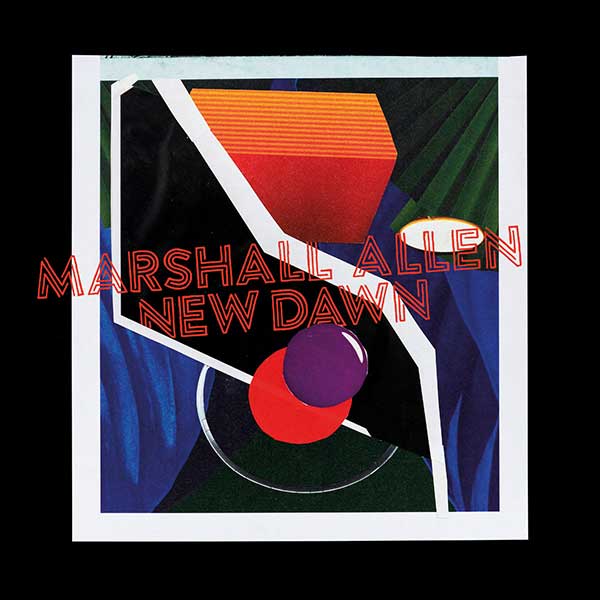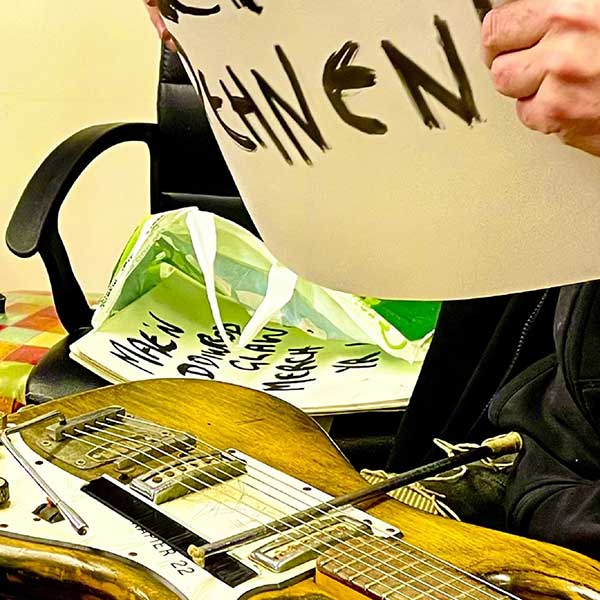New Dawn, Marshall Allen (Week-End Records)
Llif(T)#9, Llif(T) (Recordiau Dukes)

Marshall Allen joined the Sun Ra Arkestra almost seventy years ago. For the last thirty years he’s been leader of the group and, although he has worked with other musicians, the Arkestra has been the main focus of his musical life. Last year, two days after his 100th birthday, he began recording New Dawn, his first solo album, breaking the record for the oldest musician to record a solo album, previously set by British singer Colin Thackery.
There are seven tracks in all, which Allen selected from his archives, with the help of fellow Arkestra member Knoel Scott. The band is made up of a mixture of Philadelphia musicians and Arkestra veterans, including Bruce Edwards, George Gray, Cecil Brooks, Michael Ray, and bassist Jamaaladeen Tacuma, veteran of Ornette Coleman’s Prime Time band.
The album begins with a prologue – a harp solo reminiscent of the world of Dorothy Ashby and Alice Coltrane. The second track, ‘African Sunset’, is as mellow as the title suggests, with a latin feel, but with discreet futuristic EWI lines woven in, as if to let us know that space is still the place. The third, the title track, features the voice of rapper and vocalist Neneh Cherry, singing lyrics by Scott, who arranged the track. Then there’s a deliciously comfortable 12-bar blues and – in total contrast – the complex, intriguing ‘Sonny’s Dance’. The Arkestra once released a live recording of ‘Boma’, but here it gets the studio treatment. It’s nice to have both versions. The same can be said of the 5-in-a-bar ‘Angels and Demons at Play’, a Marshall composition originally recorded by Sun Ra and the Arkestra back in 1960.
There’s a warm intimacy to the recording and fans who are used to Allen’s avant-garde pyrotechnics on the sax and the EWI (Electronic Wind Instrument) are in for a surprise (the clue is in the album credits, which lists a sizeable string section). As producer Jan Lankisch put it, the album ‘showcases Marshall Allen’s musical versatility, including a surprising calmer side we may not have heard before.’

Llif(T)#9 is, as the name suggests, the ninth album put out by Llif(T), an inclusive community improvisation/experimental music group that meets in North Wales. As Ash Cooke, one of the musicians behind it, once explained to me, the albums are as much a record of the group meetings put out for the benefit of the group, as they are albums for public consumption. You could perhaps think of them as sonic ‘group selfies’ taken at Llif(T) music nights. They have a unique feel and character, which needs to be experienced to be appreciated. As the blurb for the sessions says, Llif(T) ‘welcomes players of all ages and abilities who are interested in exploring new paths to music and emphasises that no prior experience is necessary to join our sessions.’ On this album, a record of their latest session, there’s no mention as to what the musicians are playing, although the mix clearly includes vocals, percussion, objects, guitar, sax, perhaps some kind of keyboard and what sounds like an audio oscillator (or perhaps a theremin?). There are nine musicians, including, in addition to three complete newcomers, Llif(T) regulars Dave Hopewell , Rhys Trimble, Ash Cooke and John Godbert. Hopewell is half of the music/spoken word duo, Hopewell Ink. Trimble is an improvisational performer who also edits the experimental poetry e-zine ctrl+alt+del (see links, below). Ash Cooke is both an improvising guitarist and a visual artist. John Godbert (aka psychedelic lounge karaoke singer Herb Diamanté) plays small percussive toys and sax and is a long-standing member of Vibracathedral Orchestra.
There are moments of playfulness (nothing wrong in that) and times when it feels like a live recording, only the musicians are also the audience. Then there are also sublime, AMM-like moments that stretch out for minutes on end. The second track – the longest – starts with a rhythmic riff that sounds like a homage to Kraftwerk played on prepared and homemade instruments (that’s a compliment, by the way), before moving on through a series of mesmeric, developing drone-like textures. The third track builds up over the first four minutes to a quite sublime texture – you just want it to go on and on. The fourth and fifth are vaguely jazz-like. The sixth is – how can I put it? – uninhibited. As I said, there are ‘moments of playfulness’ and this track is one such (in this case extended) moment!
Listening to it all you realise there’s a whole philosophy at work: ‘llif’ is Welsh for ‘flow’ and the whole thing, what with the informality, playful spontaneity and sense of community, can be said to ‘go with the flow’. It’s not the only venture of its kind, but if there were more projects like Llif(T), the world would be better for it. And if you like it as much as I do, there’s always Llif(T)#1-8 to listen to on the Recordiau Dukes Bandcamp page.
.
Dominic Rivron
LINKS
New Dawn: https://marshallallen.bandcamp.com/album/new-dawn
Llif(T)#9: https://recordiaudukes.bandcamp.com/album/llif-t-9
ctrl+alt+del: https://ctrlaltdel.cymru/
.
